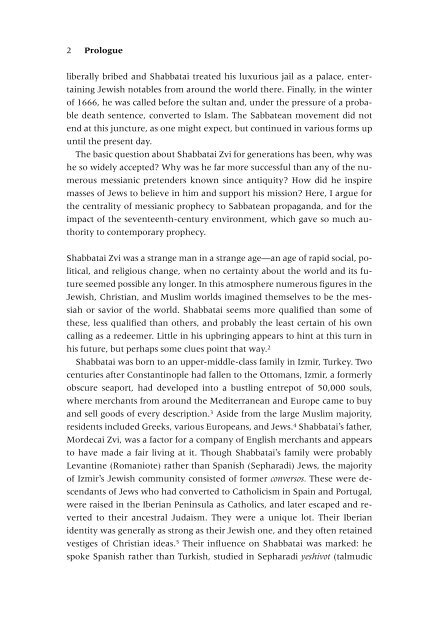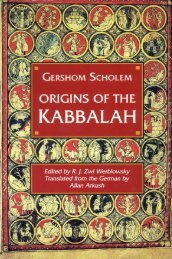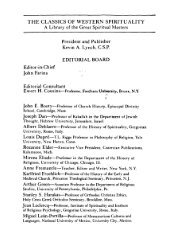Create successful ePaper yourself
Turn your PDF publications into a flip-book with our unique Google optimized e-Paper software.
2 Prologue<br />
liberally bribed and Shabbatai treated his luxurious jail as a palace, entertaining<br />
Jewish notables from around the world there. Finally, in the winter<br />
of 1666, he was called before the sultan and, under the pressure of a probable<br />
death sentence, converted to Islam. <strong>The</strong> <strong>Sabbatean</strong> movement did not<br />
end at this juncture, as one might expect, but continued in various forms up<br />
until the present day.<br />
<strong>The</strong> basic question about Shabbatai Zvi for generations has been, why was<br />
he so widely accepted Why was he far more successful than any of the numerous<br />
messianic pretenders known since antiquity How did he inspire<br />
masses of Jews to believe in him and support his mission Here, I argue for<br />
the centrality of messianic prophecy to <strong>Sabbatean</strong> propaganda, and for the<br />
impact of the seventeenth-century environment, which gave so much authority<br />
to contemporary prophecy.<br />
Shabbatai Zvi was a strange man in a strange age—an age of rapid social, political,<br />
and religious change, when no certainty about the world and its future<br />
seemed possible any longer. In this atmosphere numerous figures in the<br />
Jewish, Christian, and Muslim worlds imagined themselves to be the messiah<br />
or savior of the world. Shabbatai seems more qualified than some of<br />
these, less qualified than others, and probably the least certain of his own<br />
calling as a redeemer. Little in his upbringing appears to hint at this turn in<br />
his future, but perhaps some clues point that way. 2<br />
Shabbatai was born to an upper-middle-class family in Izmir, Turkey. Two<br />
centuries after Constantinople had fallen to the Ottomans, Izmir, a formerly<br />
obscure seaport, had developed into a bustling entrepot of 50,000 souls,<br />
where merchants from around the Mediterranean and Europe came to buy<br />
and sell goods of every description. 3 Aside from the large Muslim majority,<br />
residents included Greeks, various Europeans, and Jews. 4 Shabbatai’s father,<br />
Mordecai Zvi, was a factor for a company of English merchants and appears<br />
to have made a fair living at it. Though Shabbatai’s family were probably<br />
Levantine (Romaniote) rather than Spanish (Sepharadi) Jews, the majority<br />
of Izmir’s Jewish community consisted of former conversos. <strong>The</strong>se were descendants<br />
of Jews who had converted to Catholicism in Spain and Portugal,<br />
were raised in the Iberian Peninsula as Catholics, and later escaped and reverted<br />
to their ancestral Judaism. <strong>The</strong>y were a unique lot. <strong>The</strong>ir Iberian<br />
identity was generally as strong as their Jewish one, and they often retained<br />
vestiges of Christian ideas. 5 <strong>The</strong>ir influence on Shabbatai was marked: he<br />
spoke Spanish rather than Turkish, studied in Sepharadi yeshivot (talmudic











